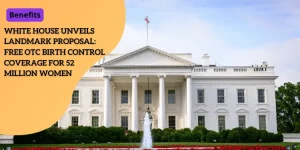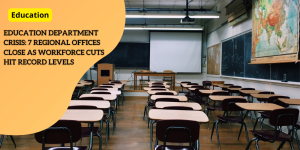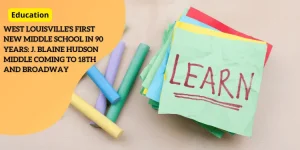Newburgh District Proposes Reduced Budget After Narrow Defeat to Avoid Deep Cuts

Anúncios
Background on the Initial Budget Defeat
The road to the revised budget for the Newburgh Enlarged City School District began with the narrow defeat of their initial budget proposal. On May 21st, the original budget was voted down by a slim margin of just 95 votes.
This made Newburgh’s school budget the only one in Orange County to fail that year, creating a challenging situation for district administrators and the community.
Anúncios
Close Vote and Immediate Feedback
The initial defeat left the district administrators with an urgent need to reassess their financial strategy.
The rejection, albeit narrow, indicated strong community opinions on fiscal prudence, possibly influenced by factors such as economic conditions, taxpayer sentiment, and previous spending patterns.
Anúncios
Community Involvement
Post-defeat, the district took substantial steps to gather community feedback.
Superintendent of Schools Dr. J. Manning Campbell emphasized that the district considered community input and the needs of students while reworking the initial budget to present a revised proposal.
This collaborative effort aimed to ensure that the revised budget would be more in line with what the voters found acceptable
History of Tax Levies
One pivotal detail that may have contributed to the initial defeat is that Newburgh has not raised the tax levy for nine years.
This historical context of fiscal conservatism made the proposed increments a significant change, requiring a careful balancing act between adequate school funding and taxpayer tolerance
The Narrow Margin’s Implications
Given that the budget was defeated by just 95 votes, both proponents and opponents of the budget realized the importance of every single vote.
This narrow margin underscored the significance of voter turnout and highlighted a divided community regarding school budget issues.
The district needed to reconcile these differences in the revised budget to avoid future financial strain and educational disruptions.
Looking ahead, the revised budget’s feasibility and community acceptance would depend heavily on how effectively these initial concerns were addressed.
The stakes were high as the district faced potential severe cuts under a contingency budget scenario if the revised budget was rejected
Revised Budget Proposal
Overview of the Revised Budget
Following the narrow defeat of the initial budget by just 95 votes on May 21st, the Newburgh Enlarged City School District Board of Education, in collaboration with district administrators, crafted a revised budget proposal.
This revised budget features a 2.48% tax levy increase, which is 1.3% less than the district’s tax cap.
This modest increase translates to an average of $9 per year for a property assessed at $300,000.
The tax levy hadn’t been increased in nine years, making this proposal both strategic and necessary.
Fiscal Responsibility and Community Input
The revised budget is a product of careful consideration and extensive community input.
Superintendent Dr. J. Manning Campbell emphasized that the district’s foremost commitment was to balance the needs of the students with the financial concerns of the community.
The community’s feedback played a crucial role in reshaping the budget to ensure fiscal responsibility without compromising the quality of education.
Maintaining Educational Standards
To preserve educational standards, the revised budget includes targeted reductions in non-essential areas such as conference and travel expenditures.
Crucially, this budget avoids additional staff layoffs, relying instead on attrition.
Positions eliminated were primarily those added during the COVID-19 pandemic and supported by temporary federal funds.
This approach allows the district to maintain average class sizes of 23-28 students at the elementary level, ensuring a stable learning environment.
Financial Implications for Property Owners
For homeowners in the district, the revised budget proposes a minimal financial impact.
The 2.48% tax levy increase results in an average of just $9 more per year for properties assessed at $300,000.
This careful calibration reflects the district’s commitment to minimize the burden on taxpayers while still securing necessary funds for educational programs and operations.
Potential Consequences of Budget Rejection
If voters reject the revised budget on June 18th, the district will be forced to implement a contingency budget.
This contingency plan requires $4.2 million in cuts, significantly impacting staff positions, equipment, supplies, and the “Grow Your Own” program.
It would also necessitate charging for community use of district facilities, a departure from the current practice of free access.
The stakes are high, and the decision will play a critical role in shaping the district’s financial and educational future.
For more details, visit the Newburgh school board’s proposal document
Cuts and Cost-Saving Measures
The Newburgh Enlarged City School District faced a tough decision after its initial budget proposal was narrowly defeated by just 95 votes in May.
As the district crafted a revised budget for a June 18th revote, it focused on implementing strategic cuts and cost-saving measures to avoid deep impacts on classroom learning and staffing.
What Was Cut?
The revised budget was meticulously designed to ensure that no additional staff layoffs were necessary.
Instead, the district made targeted cuts to conference and travel expenditures.
This strategy aimed to reallocate funds while preserving essential educational services and maintaining class sizes at the elementary level.
Travel and Conference Expenditure Reductions
By reducing conference and travel expenses, the district managed to redirect funds towards more critical areas.
Effective use of technology and localized professional development opportunities will support continued teacher and staff growth without the need for expensive travel.
Preserving Class Sizes
Maintaining optimal class sizes is a priority in the revised budget.
With average class sizes expected to remain between 23-28 students at the elementary level, the district strives to ensure a conducive learning environment.
This decision was made to foster better student-teacher interactions and enhance educational outcomes.
- ☑️ Overall class sizes will remain at manageable levels.
- ☑️ Kindergarten through second grade will receive special attention to maintain lower student counts.
- ☑️ High school class sizes will remain flexible, based on course interest and teacher contracts.
Avoiding layoffs is a significant achievement, especially given the financial constraints and the potential impact of a failed budget revote.
The decision to cut non-essential spending instead of increasing class sizes was a carefully considered approach to balance fiscal responsibility and educational quality.
As the district prepares for the June 18th revote, these measures stand as testament to the administration’s commitment to its students and staff.
The revised budget hopes to gain the community’s approval to avoid the severe $4.2 million cuts that would follow under a contingency budget.
Board Election Tie-Breaker
Introduction
The upcoming vote on June 18th will do more than just determine the fate of Newburgh’s revised school budget. Voters will also play a crucial role in settling a unique tie in the Board of Education elections.
Thomasina Bello and Philip Howard, both newly elected, found themselves in a dead heat with each receiving 856 votes in the initial election.
The community now faces a rare and important decision: to determine which candidate will serve the longer term.
The Tie-Breaker Mechanism
Newburgh’s election system dictates that the candidate with the most votes gains the longest term, with subsequent terms assigned in descending order of votes.
Since Bello and Howard tied, voters must now decide who will serve the longer term.
The new ballots will not only restate the candidates’ names but will explicitly present the choice for term length allocation, adding an intriguing twist to the usual voting procedure Source: Newburgh school board proposes reduced budget ahead of revote.
Implications for District Governance
The outcome of this tie-breaker vote has significant implications.
A stable and experienced board can drive better decision-making, particularly considering the tight financial situation.
The term lengths will affect how each member can influence long-term strategies, including budget management, educational programs, and community engagement initiatives.
Community Engagement
The close ties in both the budget vote and the board election underscore the importance of every single vote.
Community members are encouraged to participate actively in this decision-making process.
With potential impacts ranging from budgetary decisions to educational programs, informed voting is more crucial than ever.
Dr. J. Manning Campbell, Superintendent of Schools, emphasizes the need for community input in steering the district through these turbulent times Source: Newburgh school board proposes reduced budget ahead of revote.
Conclusion
As Newburgh’s voters prepare for the June 18th election, they carry the weight of multiple crucial decisions.
Beyond the revised budget, the board election tie-breaker presents another critical juncture.
The outcome will shape the district’s governance and its ability to navigate financial challenges.
- ✅ Vote Date: June 18th
- ✅ Voting Time: 12 p.m. to 9 p.m.
- ✅ Decision Pivots: Revised budget approval, Board election term determination
Contingency Budget Implications
If Newburgh’s revised budget proposal fails to gain support on June 18th, the district will face significant financial challenges.
A contingency budget would prompt $4.2 million in cuts, deeply impacting various aspects of school operations and community services.
Specific Areas Facing Reductions
Staff Positions
One of the most severe consequences would be the potential loss of staff positions.
Unlike the revised budget, which carefully avoided further layoffs through attrition, a contingency plan mandates significant reductions in personnel.
This could escalate class sizes and overwhelm remaining staff, affecting the quality of education.
Essential Resources
Several categories of essential resources would also face cuts.
Equipment and supplies, crucial for everyday school operations, would see reduced funding.
This might hinder the availability of up-to-date learning materials and technology, crucial for student engagement and learning outcomes.
Overtime
Reductions in overtime budgets can strain staff who often rely on extra hours for additional income.
This could lead to decreased morale and efficiency within the school operations, affecting both teaching and administrative tasks.
Community Initiatives
Moreover, the highly regarded “Grow Your Own” program, aimed at nurturing local talent to become future educators, is at risk.
Such cuts would not only hurt current students but could also reduce opportunities for aspiring local teachers who benefit from this initiative.
Community Use of Facilities
Another repercussion of a contingency budget would be the necessity to charge for community use of school facilities.
Traditionally, these spaces have been available at no cost to community groups and events.
Imposing fees could limit the accessibility of these facilities for community activities, reducing their overall utility and community engagement.
Voter Impact
The upcoming vote is crucial. All registered voters in Newburgh should understand the severe implications of a contingency budget.
Participation in the voting process on June 18th, between 12 p.m. and 9 p.m., will directly impact the district’s financial strategy and the educational experience of its students.
For more detailed information, you can refer to the district’s presentation.






